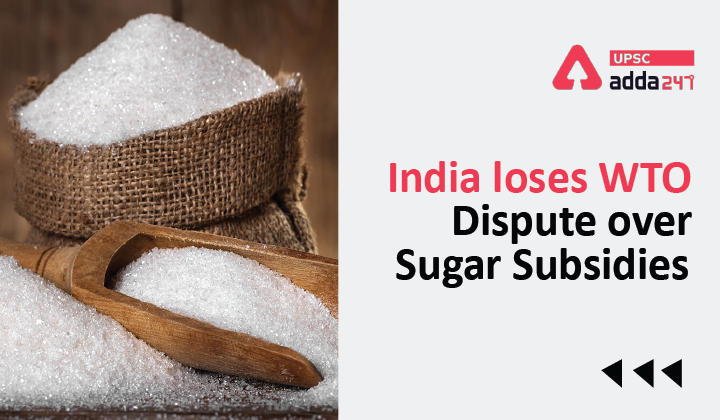Table of Contents
WTO Dispute Settlement Mechanism: Relevance
- GS 2: Bilateral, regional and global groupings and agreements involving India and/or affecting India’s interests.
WTO Dispute Settlement Mechanism: Context
- Recently, a World Trade Organisation (WTO) panel has ruled against India’s sugar export subsidy and domestic support to sugarcane growers.
India Loses WTO Dispute over Sugar Subsidies: Key points
- Australia, Brazil and Guatemala had challenged some of India’s policy measures in the sugar sector at the WTO dispute panel in 2019.
- The countries complained that domestic support provided by India to sugarcane producers was in excess of the limit allowed by the WTO and India provides prohibited export subsidies to sugar mills.
- The panel ruled that India has violated international trade rules as it offered excessive subsidies for the production and export of sugar and sugarcane.
- However, India has said that it will appeal against the verdict.
WTO Dispute Settlement Cases: Violation of Agreement of Agriculture
- The WTO panel has found that India provided non-exempt product-specific domestic support to sugarcane producers in excess of the permitted level of 10 per cent of the total value of sugarcane production.
- The panel has asked the Indian Government to withdraw the subsidies within 120 days.
- According to the panel, India has provided subsidies contingent upon export performance, which are inconsistent with the SCM (Subsidies and Countervailing Measures) Agreement.
- The Agreement on Subsidies and Countervailing Measures (“SCM Agreement”) addresses two separate but closely related topics: multilateral disciplines regulating the provision of subsidies, and the use of countervailing measures to offset injury caused by subsidized imports.
India Loses WTO Dispute over Sugar Subsidies: Impact
- The commerce department has said that there will be no impact of the panel’s findings on any of India’s existing and ongoing policy measures in the sugar sector.
- India — the world’s largest sugar producer after Brazil — has already pledged to refrain from subsidizing sugar exports this year due to high global prices. So, there is no export subsidy for sugar as of now.
- For the current 2021-22 marketing year, India dropped an export subsidy that was in place for the last three years. These subsidies helped Indian mills to export a record 7.2 million tonnes of sugar in the 2020/21 season.
- Indian sugar mills are already contracted to export 3.5 million tonnes of sugar this year and could ultimately export more than 6 million tonnes.
India Loses WTO Dispute over Sugar Subsidies: What next?
- The panel report shall be adopted by the WTO’s Dispute Settlement Body (DSB) within 20 to 60 days of circulation, unless the DSB decides by consensus not to adopt it or either party notifies its decision to appeal.
- India can appeal the ruling at any point in the next 60 days, a move that would act like a veto because the WTO’s appellate body is not functioning.
Also Read:





 TSPSC Group 1 Question Paper 2024, Downl...
TSPSC Group 1 Question Paper 2024, Downl...
 TSPSC Group 1 Answer key 2024 Out, Downl...
TSPSC Group 1 Answer key 2024 Out, Downl...
 UPSC Prelims 2024 Question Paper, Downlo...
UPSC Prelims 2024 Question Paper, Downlo...
